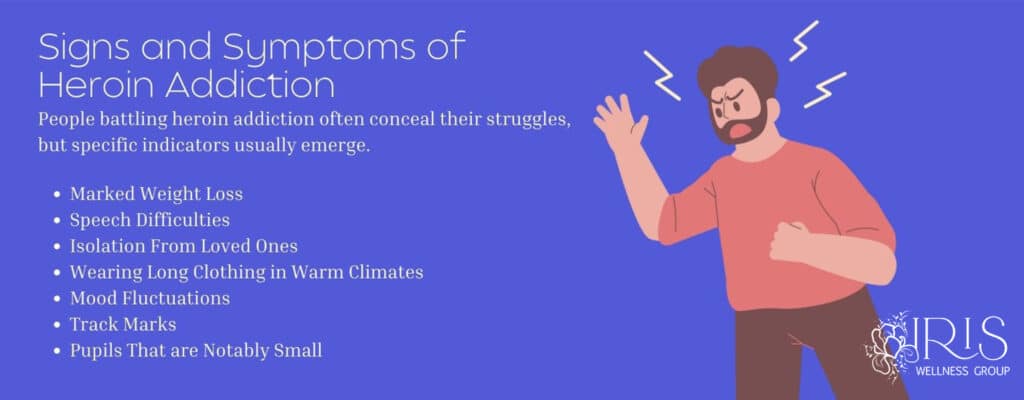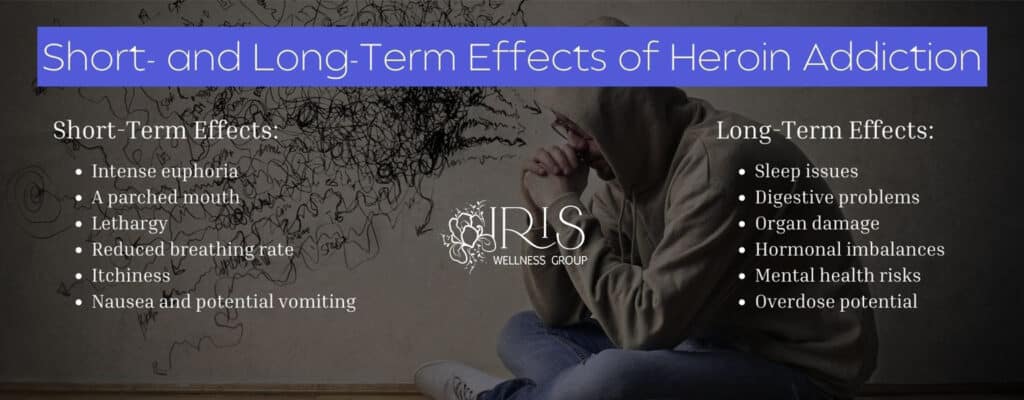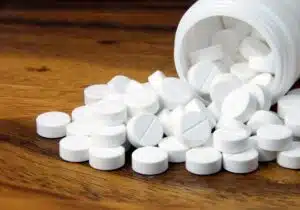Table of Contents
Heroin abuse remains a pressing issue in the U.S., with nearly 1 million people admitting to its use in the past year. Fortunately, various effective treatments are available for overcoming addiction to heroin and other opioids. These professional treatments have been instrumental in helping numerous individuals, from those with mild dependencies to those severely addicted, to achieve long-term sobriety.
Factors leading to heroin addiction differ among individuals, but the central challenge remains consistent: the persistent use of heroin despite its detrimental effects. Individuals with a substance use disorder (SUD) often find themselves dedicating considerable time and resources to sourcing heroin or similar drugs. Professional interventions not only ensure safety during detox and withdrawal but also pave the way for sustained recovery.
The consequences of untreated heroin addiction are severe, affecting countless individuals and families across U.S. communities. However, with the right care and intervention, many can transition from a life dominated by addiction to one of health, hope, and fulfillment. Iris Wellness Group offers specialized heroin addiction treatment in Chattanooga, TN. Call us today at 423-919-9549 to begin your heroin treatment
What is Heroin?
Heroin is a highly addictive opioid drug known for its intense euphoric effects. Classified as a depressant and a Schedule I drug, it has no accepted medical uses and poses a high risk of abuse. Originating from morphine, which is extracted from certain poppy plants primarily grown in regions like Southeast and Southwest Asia, Colombia, and Mexico, heroin is nonetheless widely accessible across the United States.
Commonly known by street names such as H, horse, smack, and hell dust, heroin usually appears as a white or brown powder. Some adulterate or “cut” it with substances like baby powder or cornstarch, while others produce a sticky variant called black tar. Heroin can be consumed in various ways: it can be snorted, smoked, or dissolved in water and injected.
Upon consumption, heroin activates the brain’s opioid receptors, altering pain perception and producing intense pleasure. The resultant dopamine surge in the brain’s reward center reinforces its use, often leading individuals to continuously seek and crave the drug’s powerful high.

Signs and Symptoms of Heroin Addiction
People battling heroin addiction often conceal their struggles, but specific indicators usually emerge. Here are some prevalent signs of heroin addiction:
- Marked weight loss
- Pupils that are notably small
- Speech difficulties
- Excessive drowsiness
- Sudden shifts in energy levels
- Mood fluctuations, including unexpected bouts of anger
- Moments of confusion or disorientation
- Wearing long clothing in warm climates, possibly to hide injection-related marks
- Neglecting personal appearance and hygiene
- A decline in work or academic performance
- Often skipping school, work, or essential commitments
- Isolation from loved ones
Two defining indicators of heroin addiction are tolerance and withdrawal. Tolerance implies the need to consume more heroin for the same effect, while withdrawal signifies physical and emotional distress when reducing or stopping its use. Both signs highlight the body’s adjustment to the drug’s presence.
Understanding the Risks of Heroin Relapse and Overdose
Relapse is a significant concern for those recovering from heroin addiction. Once a person undergoes treatment, their tolerance to the drug decreases. If they relapse and consume heroin in the same quantities as before treatment, it can be overwhelming for their body.
Heroin impacts the central nervous system, influencing automatic functions like heart rate and breathing. This connection makes heroin overdoses particularly dangerous.
Signs of a heroin overdose include:
- Weak pulse
- Shallow or slow breathing
- Severe disorientation
- Unconsciousness and unresponsiveness
- Bluish tint around the lips and fingertips
- Involuntary tics or spasms
Immediate medical attention is crucial for anyone displaying these signs after using heroin. Calling 911 is vital. Without prompt intervention, a heroin overdose can be lethal. Administering Narcan can be lifesaving. In 2020, heroin overdoses caused over 13,000 deaths in the U.S. Between 1999 and 2020, heroin overdoses claimed the lives of more than 143,000 Americans.
Heroin Withdrawal
When an individual develops a physical reliance on heroin and then attempts to cease its use suddenly, they can encounter a range of challenging withdrawal symptoms. The physical symptoms of heroin withdrawal, such as diarrhea, nausea, muscle aches, bone pain, and chills can complicate the quitting process. Many may be tempted to use the drug again to alleviate or postpone these discomforts. Seeking professional medical detox and withdrawal management can significantly ease this initial recovery phase for those aiming to break free from heroin.

Short- and Long-Term Effects of Heroin and Heroin Abuse
Heroin consumption poses a multitude of harmful impacts on an individual’s mental and physical well-being. Short-term effects encompass:
- Intense euphoria
- A parched mouth
- Lethargy
- Reduced breathing rate
- Itchiness
- Nausea and potential vomiting
Consistent heroin users may experience the following lasting repercussions:
- Persistent sleep disturbances
- Digestive issues like constipation
- Potential damage to lungs, kidneys, and the liver
- Hormonal imbalances leading to sexual dysfunction and menstrual irregularities
- An increased likelihood of mental health disorders, notably depression
- Heightened risk of respiratory distress, potentially leading to an overdose
Furthermore, those who administer heroin via injections might face added health concerns, such as:
- Increased susceptibility to HIV
- Risks of contracting hepatitis
- Potential heart infections
- Development of skin abscesses
Benefits of Heroin Addiction Treatment in Chattanooga
Advantages of undergoing heroin addiction treatment in Chattanooga, Tennessee at Iris Wellness Group include:
- Comprehensive Treatment Options: We provide a diverse range of services, starting with collaborations with detox centers, followed by a sequence of programs including partial hospitalization (PHP), intensive outpatient programs (IOP), specialized adolescent outpatient programs, virtual IOP, and outpatient rehab. All these are designed to offer customized care based on each individual’s unique needs.
- Welcoming Space: Our facility offers a secure, serene environment crafted for utmost comfort. Conveniently located, we’re within easy reach for residents of Chattanooga and nearby regions.
- Expert Care Team: At Iris Wellness Group, our adept professionals prioritize each individual’s well-being. By understanding you personally, we ensure your treatment plan is precisely tailored to your needs.
- Community Strength: Treatment here also provides the chance to connect and share experiences with others on similar recovery journeys. Overcome the loneliness of addiction and reap the rewards of a supportive recovery community at our center.
Seek a Brighter Future and Start Your Heroin Addiction Treatment Today!
How Long is Rehab for Heroin Treatment?
Entering treatment for a substance use disorder can be daunting. Concerns often include perceptions by loved ones, financial implications, or the duration of the treatment. It’s vital to understand that individualized paths to recovery exist; there’s no universal formula.
Although recovery paths vary, several foundational treatment options exist, tailored to individual needs. Standard program durations include:
- 30-day program
- 60-day program
- 90-day program
- Extended care options like sober living facilities or halfway houses.
When selecting a program, it’s crucial to prioritize long-term success potential. Many individuals find a minimum of three months of treatment optimal for achieving sobriety and establishing a long-term recovery plan. Research indicates longer treatments yield better outcomes. While extended programs might seem overwhelming initially, they often provide the best foundation for sustained recovery.
Begin Heroin Treatment in Chattanooga, TN
Iris Wellness Group stands as a leading facility for personalized heroin addiction treatment in Chattanooga and its neighboring regions. Catering to both adults and adolescents, our center specializes in addressing the challenges of heroin addiction, other substance use disorders, and co-occurring mental health issues. Let us guide you away from heroin dependence and towards a brighter, healthier future. Call us today at 423-919-9549 or verify your insurance to begin your heroin treatment.
Heroin Frequently Asked Questions
What Does Heroin Look Like?
Heroin can appear in several forms. The most common is a white or brownish powder. Another form, known as “black tar” heroin, looks like a black, sticky substance. Its appearance can vary depending on how it’s processed and what it’s mixed with.
How Is Heroin Abused?
Heroin can be abused in various ways, including injecting, snorting, or smoking. Injection is the most dangerous method due to the risk of overdose and the potential for contracting diseases from needle sharing.
How Many Teens Abuse Heroin?
Heroin use is a significant issue among teenagers and young adults. According to the National Household Survey on Drug Abuse, approximately 76,000 individuals aged 12 to 17 and 474,000 individuals aged 18 to 25 in the U.S. have used heroin at least once. Among high school students, heroin use is particularly concerning. The University of Michigan’s Monitoring the Future Survey indicates that nearly 2 percent of high school seniors in the United States have tried heroin at least once in their lifetime, with nearly half of these students having injected the drug. These statistics highlight the importance of targeted prevention and education efforts for this age group.
Is Heroin Addictive?
Yes, heroin is highly addictive. It is an opioid that produces intense euphoria and feelings of relaxation, which can lead to rapid psychological and physical dependence.
Why Is Heroin So Addictive?
Heroin is so addictive because it rapidly enters the brain and binds to opioid receptors, releasing large amounts of dopamine and creating intense feelings of pleasure and euphoria. This strong reward response can lead to compulsive use and addiction.
How Addictive Is Heroin?
Heroin is one of the most addictive substances available. Its ability to quickly produce intense euphoria makes it highly addictive, with a high risk of developing tolerance, dependence, and addiction.
What Are Some Signs That Someone Is Abusing Heroin?
Signs of heroin abuse include noticeable euphoria, drowsiness, changes in behavior, disorientation, constricted pupils, sudden weight loss, changes in appearance, and neglect of responsibilities. Physical signs include track marks from injection.
How Long Does It Take to Get Addicted to Heroin?
Addiction to heroin can develop quickly, sometimes after just a few uses. The time frame varies among individuals, depending on factors like the frequency of use, the method of administration, and personal susceptibility to addiction.
How Does Heroin Affect the Brain?
Heroin affects the brain by binding to opioid receptors, which control pain and pleasure. This leads to the release of dopamine, causing intense feelings of euphoria. Over time, heroin use can alter the brain’s reward system, leading to addiction.
How Long Does Heroin Stay in Your System?
Heroin typically stays in the system for a short duration. It can be detected in urine for up to 3 days, in blood for up to 6 hours, and in hair for up to 90 days. The exact time can vary based on factors like the amount used, frequency of use, and individual metabolism.
Who is Chattanooga Heroin Rehab Designed For?
Chattanooga heroin rehab caters to individuals living in Chattanooga, Red Bank, Signal Mountain, Lookout Mountain, Southeastern Tennessee, Northern Georgia, or surrounding areas. These services are ideal for those who do not require medically supervised detoxification, have a stable and supportive home and work environment, and are self-motivated in their journey towards recovery.
How Does a Treatment Center Help Heroin Addicts?
A treatment center helps heroin addicts through medically supervised detoxification, therapy, counseling, and support groups. Treatment centers provide a structured environment to address the physical and psychological aspects of addiction and offer tools for long-term recovery.









